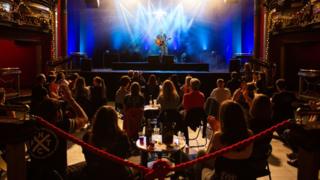This website uses cookies so that we can provide you with the best user experience possible. Cookie information is stored in your browser and performs functions such as recognising you when you return to our website and helping our team to understand which sections of the website you find most interesting and useful.
 Image copyright PA Media
Image copyright PA MediaA gig used to trial safety measures for the return of live music "did not succeed" in providing a blueprint for the industry, according to the manager of the venue that hosted the event.
Folk rocker Frank Turner played to a socially-distanced audience at London's Clapham Grand on Tuesday.
Only 200 people attended, compared to the venue's normal capacity of 1,250.
Venue manager Ally Wolf said the government-backed pilot was not financially viable for venues.
"It can't be the future for live music, it can't be the future for venues," he said, noting that the show did not make enough money to cover the venue's operating costs, even before the performer's fee was taken into account.
Live music in the UK has been almost completely cancelled since March, due to the lockdown and social-distancing regulations.
Major tours and festivals have all been called off. A tour of drive-in gigs, featuring acts like The Streets, Kaiser Chiefs, Dizzee Rascal and Sigala was also scrapped, with organisers saying the "latest developments over local lockdowns" meant they couldn't proceed "with any confidence".
However, some test shows have now been permitted, to explore how live music could return as lockdown restrictions ease.
Last week, Beverly Knight played a socially distanced gig at the London Palladium venue, ahead of the proposed reopening of theatres on 1 August.
Turner said Tuesday's show was his "first proper gig in over four months" and described it as a "strange, emotional evening".
Wolf said that, while Turner's performance was "great" and it was nice to see an audience back inside the venue, he was not about to get "caught up in the jubilation of finally being able to put on a show".
He said the pilot was "not a financial model that the industry can remotely rely upon to get to be sustainable" and would be particularly damaging for smaller venues.
The BBC has asked the government for a comment about the pilot concert.
What was The Clapham Grand pilot experience like?
- Seating and tables were brought into The Clapham Grand - a venue were people usually stand to watch shows - to allow for social distancing.
- Gig-goers were asked to arrive at staggered intervals and had their temperature checked as they entered the building.
- They were then able to order drinks to their tables.
- One-way systems were put in place around the venue
Turner had previously performed a live-streamed Facebook fundraising gig "to raise cash for my touring family, who are all tough financial straits" during the lockdown.
Speaking before the show on Tuesday, he stressed how strange it would be to play a tour of venues that were less than one-fifth full.
"A huge part of performance is the energy exchange with the crowd and as a performer you feed off that energy that is coming back at you," said the singer.
"You put it out, it comes back and it becomes a kind of virtuous circle and that is what makes a great show."
"It is obviously going to be much harder to slip into that groove for many obvious reasons," he added.
Earlier this month, following pleas for help from big-name stars including Dua Lipa, Liam Gallagher and Sir Paul McCartney, a £1.57 billion support package for the arts was announced by culture secretary Oliver Dowden.
However, Dowden admitted it would not be enough to save every job.
Two popular Manchester music venues were recently saved from closure after a deal was agreed with help from gig promoters and Charlatans singer Tim Burgess, yet many more concert halls across the UK remain under threat.
Follow us on Facebook, or on Twitter @BBCNewsEnts. If you have a story suggestion email entertainment.news@bbc.co.uk.



 Africana55 Radio
Africana55 Radio 
